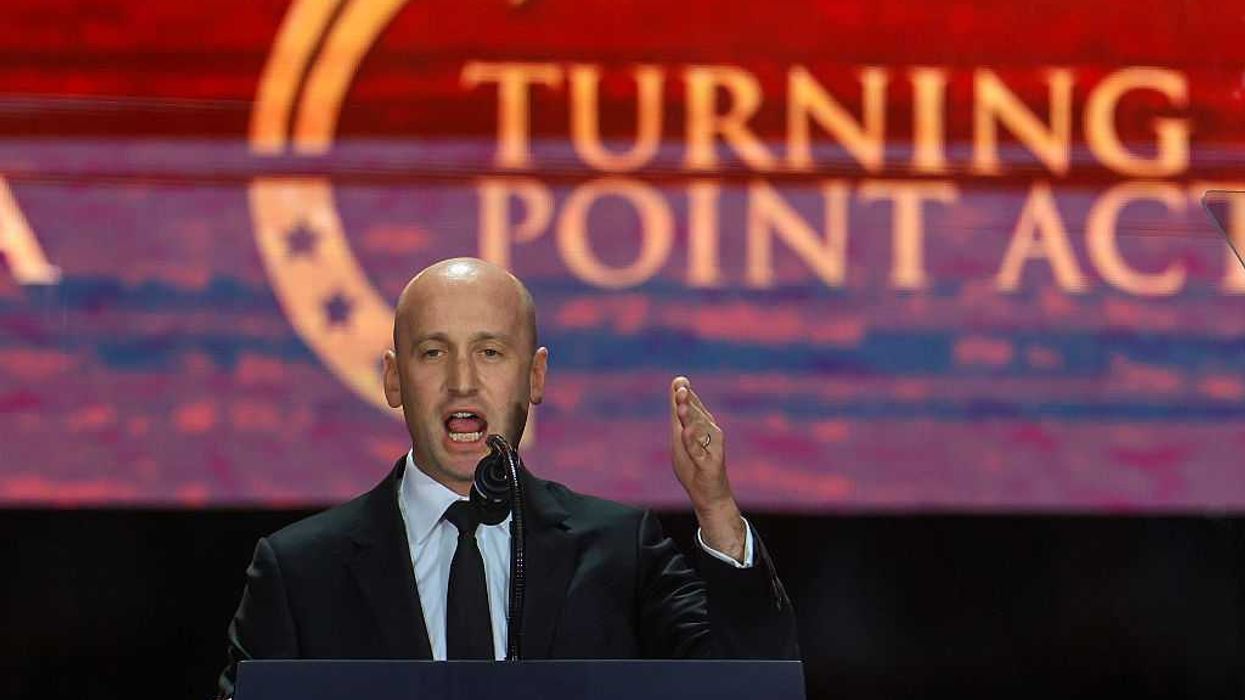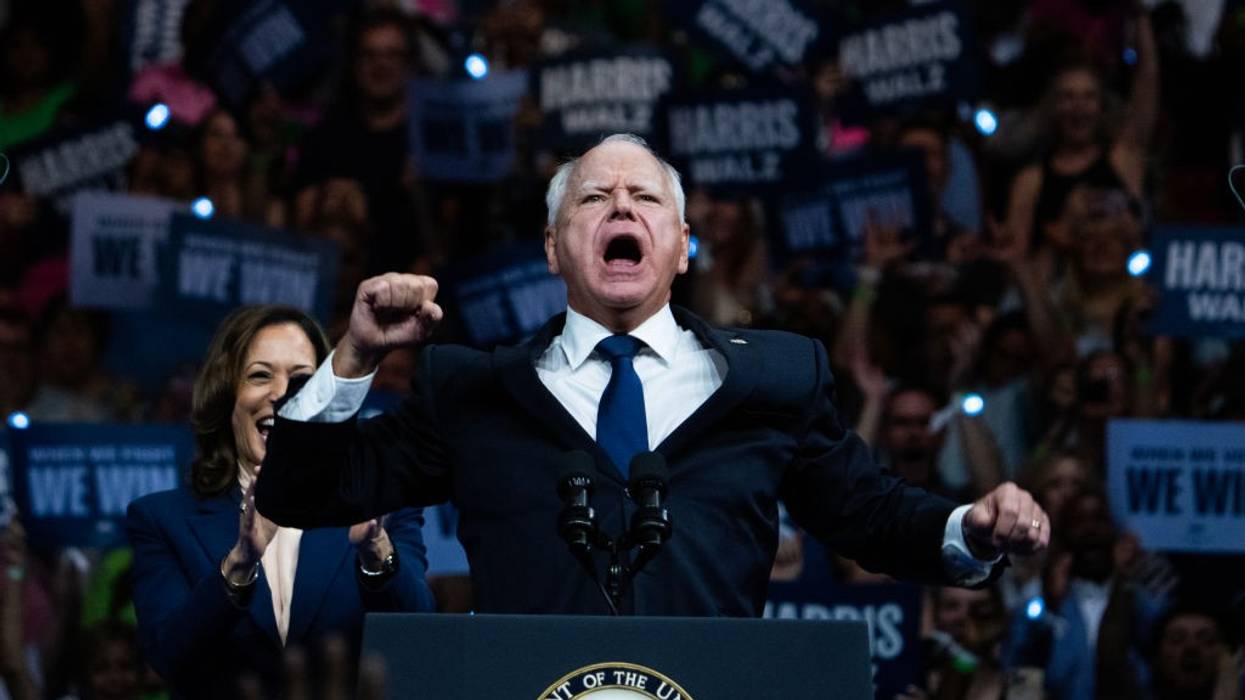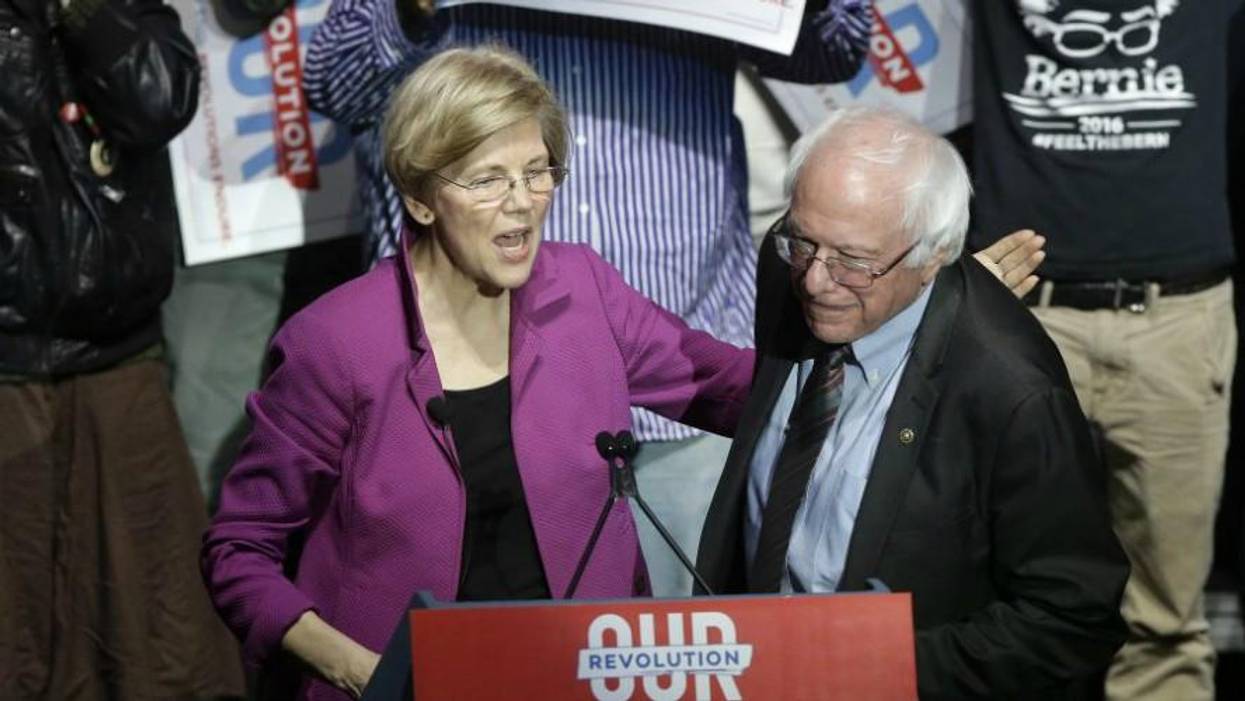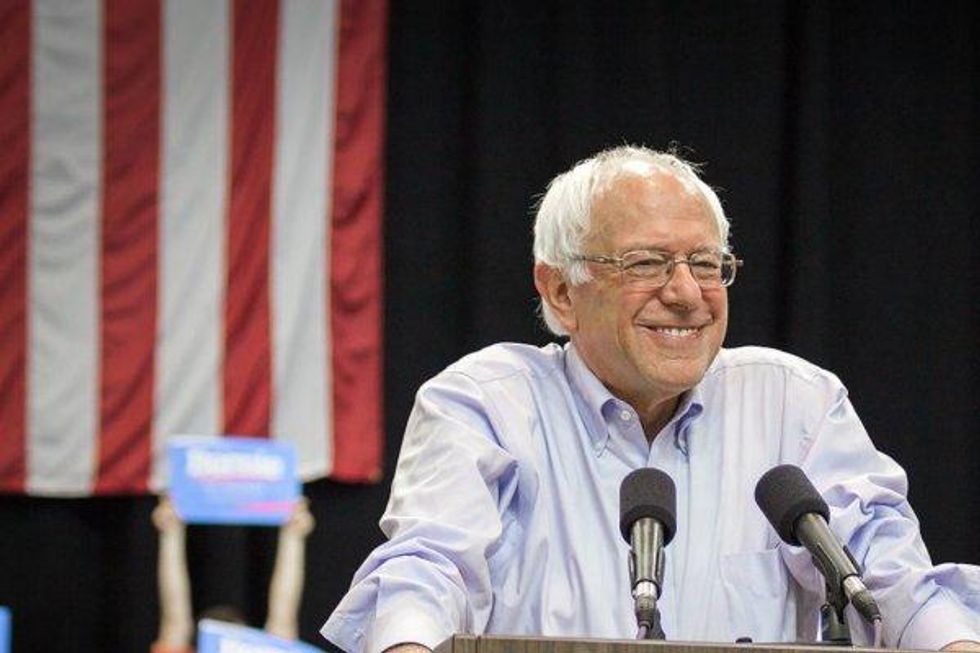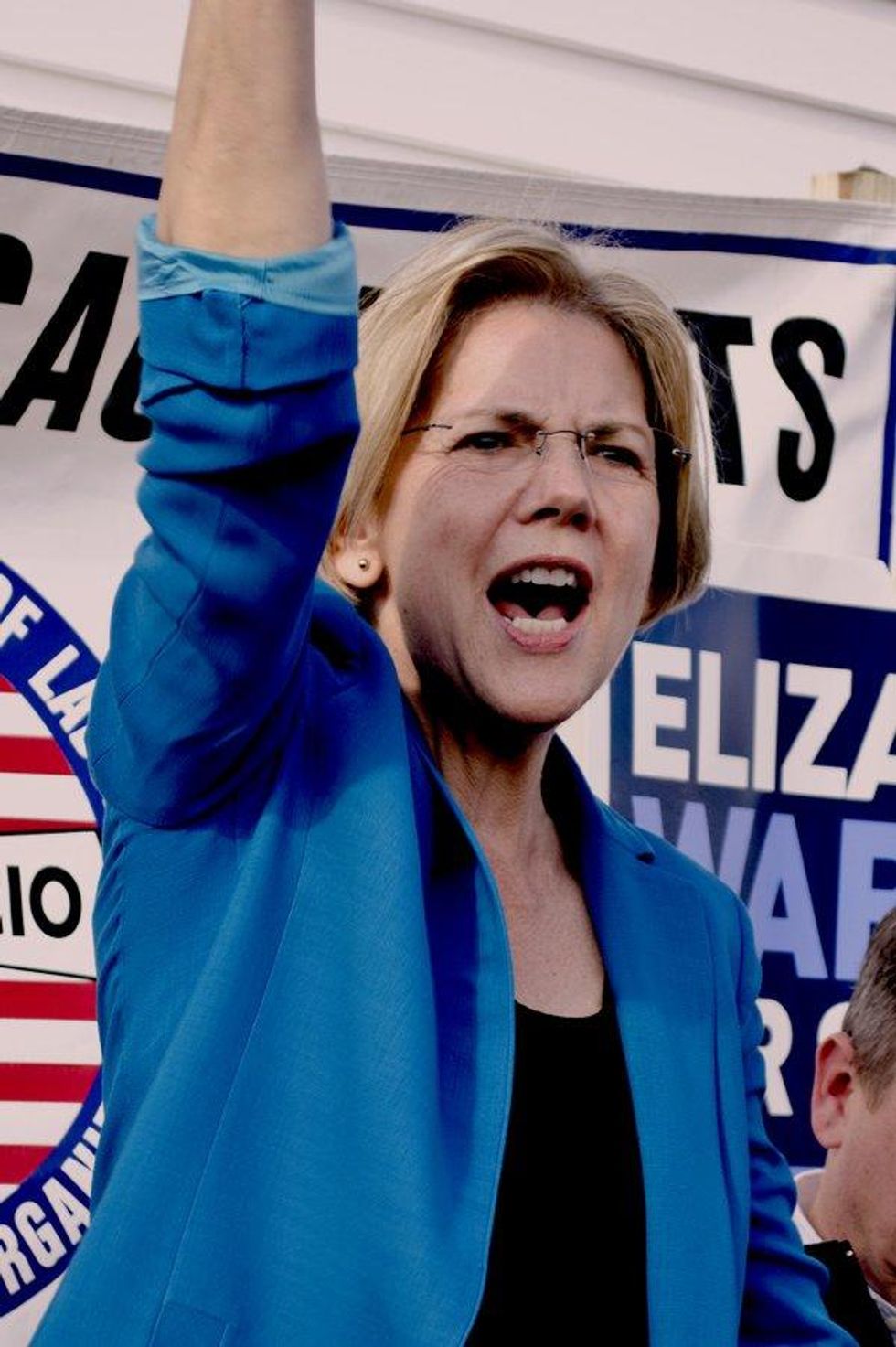From Paul Wellstone to Charlie Kirk: What It Means to 'Politicize' a Memorial Service
Republicans appear to be paying no price for turning the Kirk event into a right-wing, Christian nationalist, white supremacist MAGA political rally.
The memorial services for Charlie Kirk last week and for Senator Paul Wellstone in 2002 illustrate how much our political culture has changed over the past two decades.
Both men were charismatic figures on opposite ends of the political spectrum. Wellstone died in a plane crash. Kirk was murdered on a college campus. Wellstone was an elected official. Kirk was a political agitator. They both lived interesting lives. But what’s fascinating is how their respective supporters, their opponents, and the media reacted to their deaths and, in particular, to the memorial services organized to eulogize them.
Wellstone, a former community organizer and political science professor at Carleton College, was elected to the U.S. Senate in 1990, defeating a Republican opponent with a grassroots campaign that included clever TV ads emphasizing his low-budget operation and his high-energy activism. He won reelection six years later. At the time, he was the Senate's most progressive member (Bernie Sanders was not yet in the Senate) and was known as the "conscience of the Senate."
On October 25, 2002, Wellstone (along with seven others, including his wife) died in a small plane crash, one week before the election in which he was running for a third term. Minnesota law required that Wellstone’s name be stricken from the ballot and replaced by the Democratic Farmer Labor Party. One day after the crash, the DFL selected former Vice President Walter Mondale as its Senate candidate.
On October 29, Wellstone’s family and friends organized a public memorial event at the Williams Arena in Minneapolis (the University of Minnesota's basketball arena), which was broadcast live on national TV. High-profile Democrats (including former president Bill Clinton) and Republicans (including Senator Trent Lott) as well as Minnesota Gov. Jesse Ventura (an independent) attended the service, but only Wellstone's family and close friends spoke at the event.
Their remarks were not vetted or scripted. One of the speakers was Wellstone's close friend and former campaign treasurer, Rick Kahn. He began his speech as a conventional eulogy, but it shifted into a call to action, suggesting that the best way to honor Wellstone's memory was to keep organizing: "We’re gonna organize, we’re gonna organize, we’re gonna organize, we’re gonna organize, we’re gonna organize, we’re gonna organize!...[T]ogether, we can and will continue to fight every one of his fights; and together we can and will achieve great victories in Paul Wellstone’s name.’’ Kahn then rallied the crowd by urging them to "keep Paul Wellstone's legacy alive" by helping Mondale win the Senate election.
Republicans immediately attacked the Democrats for turning the memorial service into a political rally. They demanded "equal time" on TV to counter the event's messages. Former Republican Minnesota congressman Vin Weber said, ‘‘The DFL clearly intends to exploit Wellstone’s memory totally, completely and shamelessly for political gain. To them, Wellstone’s death, apparently, was just another campaign event.
The Republicans were particularly rankled that two weeks earlier, Wellstone was among the 21 Senate Democrats (out of 50) to vote against the authorization for the use of US military force in Iraq, a key component of President George W. Bush's rally-round-the-flag response to the 9/11 bombing. They also knew that if the GOP candidate (former St. Paul Mayor Norm Coleman) defeated Mondale, it would flip the Senate, so they orchestrated a full-scale attack on the Democrats for politicizing the Wellstone memorial event.
The media echoed the Republicans' (as well as Ventura's) attack on the Democrats for “politicizing” the memorial event. The orchestrated backlash worked. A poll conducted by the Minneapolis Star-Tribune a few hours before the memorial service found that Mondale was leading Coleman by eight points. But on election day, Coleman won by 2.2%. His victory ended the Democrats' one-seat majority in the Senate. On election day, Republican Tim Pawlenty won a three-way race for Minnesota governor, while the GOP flipped one House seat and made gains in the state legislature.
Some journalists and professors began describing what occurred as the "Wellstone effect." For example, after Senator Ted Kennedy, the key proponent of universal health insurance, died in 2009, Rush Limbaugh warned that Democrats would turn his memorial service into a "Wellstone memorial on steroids." NBC News observed that ‘‘Anyone addressing the health care bill at the [Kennedy] service will tread a fine line between taste and politics...The dangers of politicizing a memorial event were illustrated by a 2002 memorial for Sen. Paul Wellstone."
The memorial service for Charlie Kirk (at a football stadium in Glendale, Arizona) was obviously a political rally by MAGA Republicans to turn Kirk into a martyr for their cause, to keep his legacy and his right-wing organization Turning Point USA alive, and to exact vengeance and whip up anger against Democrats, liberals, "the left," the media, and all those Trump views as his opponents. Kirk held no office, but he was close to Trump and Vice President JD Vance. His final speaking tour (which included the Utah event where he was killed) was clearly intended not only to build the MAGA movement but also to help Republicans win the 2026 midterm House elections that Trump is worried they could lose.
Trump used his 40-minute speech to highlight campaign talking points like tariffs, crime in Chicago, and fear-mongering about the unproven consequences of Tylenol as well as to call for revenge against his opponents.
“Charlie Kirk truly was ... he was a missionary with a noble spirit and a great, great purpose,” the president said. “He did not hate his opponents. He wanted the best for them. That's where I disagreed with Charlie. I hate my opponent and I don't want the best for them.”
Several speakers praised Kirk’s mission to carry out a conservative Christian vision of the United States. “We always did need less government,” said Defense Secretary Pete Hegseth. “But what Charlie understood and infused into his movement is that we also needed a lot more God.”
Tucker Carlson even compared Kirk’s murder to the crucifixion of Jesus Christ.
The most vitriolic remarks came from Stephen Miller, Trump’s key consigliere, who the previous week vowed to avenge Kirk’s death by “go[ing] after the left-leaning organizations” that, he claimed, “are promoting violence in this country.”
At Kirk’s memorial service, Miller -- a foaming-at-the-mouth fanatic -- declared: “Erika [Kirk's widow] is the storm. We are the storm. And our enemies cannot comprehend our strength, our determination, our resolve, our passion."
“Our lineage and our legacy hails back to Athens, to Rome, to Philadelphia, to Monticello,” Miller continued. “Our ancestors built the cities. They produced the art and architecture. They built the industry,” he said, pulling “us out of the caves and the darkness into the light."
“We built the world that we inhabit now, generation by generation, and we will defend this world,” he added.
Addressing “the forces of wickedness and evil,” Miller thundered. “You have nothing. You are nothing. You are wickedness, you are jealousy, you are envy, you are hatred. You are nothing. You can build nothing. You can produce nothing. You can create nothing. We are the ones who build. We are the ones who create. We are the ones who lift up humanity."
“You have no idea the dragon you have awakened,” he warned, as the MAGA movement will strive to “save this civilization, to save the west, to save this republic, because our children are strong, and our grandchildren will be strong, and our children’s children’s children will be strong. And what will you leave behind? Nothing, nothing.”
Even if one believes that Paul Wellstone's friends and family, acting out of grief, erred in politicizing the 2002 memorial service, nothing said at that event reflected the kind of hate-mongering, venom-spewing, and demonizing of opponents that we saw at the Kirk memorial, which was like a combination of a religious revival meeting and a KKK rally. Our culture has come to accept as normal the kind of hysterical rants and raves espoused by Kirk's friends and colleagues, including Trump, Vance, and Miller.
Moreover, after the Republicans and much of the media ganged up to condemn the Wellstone memorial, the Democrats paid dearly. In contrast, Republicans appear to be paying no price for turning the Kirk event into a right-wing, Christian nationalist, white supremacist MAGA political rally.
Unlike the Republicans' backlash against the Wellstone memorial service, which they claimed was illegitimate and even illegal, today’s Democratic leaders, liberals, and the mainstream media seem intimidated from telling the truth about the memorial service that echoed and honored Kirk's outrageous views, which, polls show, are strongly opposed by most Americans. The failure of current Democratic leaders and the media to challenge this apocalyptic, white supremacist, Christian nationalist fever is part of the problem.
